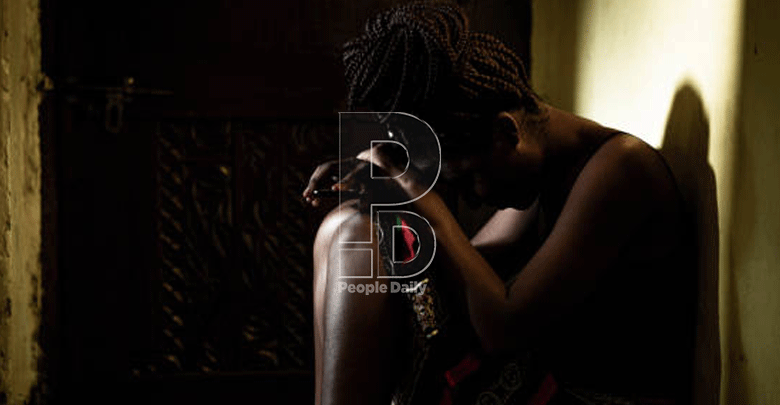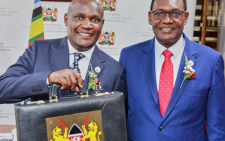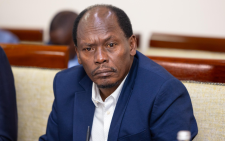Marital rape: Shrouded in deep silence

Many women suffer in silence because they don’t know how to address cases of spousal rape. But even when they speak up, does the law protect them from this?
Sandra Wekesa @wekesa_sandra
When Rose Waithera (not her real name) discovered that she had cervical cancer she automatically knew things wouldn’t be the same in her union.
With constant bleeding after sexual intercourse and the never-ending pain, she would often feel anxious every time her husband wanted to have sex.
“He was present when the doctor explained we had to stop getting intimate until I started my treatment. He knew our sex life was now about to change and he agreed to it,” she says.
However, one day after her husband came home after a night of drinking, he tried to have sex with her. Even after she tried to stop him, he still insisted and forcibly had intercourse with her.
“I kept on screaming for help, but he covered my mouth saying I would wake everyone up.
This wasn’t the first time it was happening because he would constantly do this on nights he came home late and tipsy,” she says. This went on for some time until her uterus ruptured.
Lacuna in law
“Turns out the more he forced himself on me, the more he pushed the mass in my cervix, which was causing cancer, hence leading to the rupture,” she says.
Rose, just like many women in marriages, is a victim of marital rape, non-consensual sex in which the perpetrator is the victim’s spouse.
Antony Odeck, an advocate, says the Sexual Offences Act 2006, whose purpose was to extend protection to victims of sexual offences, has, for the most part, been lauded as a progressive piece of legislation but it did not address the issue at hand.
“While the Act successfully addressed a variety of important issues for women, it would have been a golden opportunity for Kenya to address marital rape. However, the opportunity was missed.
While the initial intention was to include provisions outlawing marital rape, this provision was eventually deleted from the Bill and an explicit marital rape exemption enacted.
The effect of this exemption is to establish the basis for legal impunity for marital rape, leaving no protection for married women,” he says.
He adds that this constitutes discrimination against women based on marital status and a violation of their fundamental human rights, particularly the rights to equality, dignity and bodily integrity.
“The establishment of British colonial rule in Kenya in the late 19th century was accompanied by the superimposition of English law over the indigenous people.
This resulted in legal plurality, where customary law co-exists with state law. The inherited colonial laws were infused with British values and culture.
At the time, the British concept of the family was that of a husband/wife arrangement in which the husband was the breadwinner and head of household.
In this nuclear family, the wife was the “domesticated”, economically dependent consumer,” says Odeck.
Under obligation
He adds that it was, therefore, inconceivable that a husband could rape his wife, as she was part of his person.
This was reinforced by customary law norms that lent credence to the idea that upon marriage, a woman became part of her husband’s property for him to do with her as he pleased.
Such set up has put women at a disadvantage, as they are unable to understand the nature of the act as in the case of Rose who did not know what she was going through was marital rape.
In other cases, women are afraid of the retaliation, discrimination and shame that surround the topic.
“Marital rape is about exerting power and control over one’s partner. Surprisingly it is more common than stranger rape, which proves it is a ‘hidden crime’,” Brian Otieno, a psychologist, says, adding that it is sad that many women across the world don’t know it is illegal, and even if they know, they are discouraged from reporting by norms and social stigma.
He says damages caused by marital rape could be far much worse than any other form of assault.
“People assume because the husband and wife already have an intimate relationship, then forced intercourse is less traumatic, but in the actual sense this form of violence could lead to fear, shock, and more often the wife might feel some sense of betrayal,” he adds.
Elsie Milimu, a gender-based violence advocate at Center for Rights Education and Awareness, says Kenyan law is inadequate to protect married women from sexual violence by their spouses.
“The Kenyan state is under obligation at the international and regional levels to enact legislation and take other measures to ensure such protection, including dealing with gender stereotypes and negative cultural attitudes and practices,” she says.
“Criminalisation of marital rape is required as a first and immediate measure to remove the marital rape exemption in the Sexual Offences Act, as this would provide married women with an avenue to access justice who they have hitherto been denied,” she says.
However, criminalisation, though necessary, is not sufficient and must be supplemented by additional measures including judicial training as well as public education and awareness-raising.












